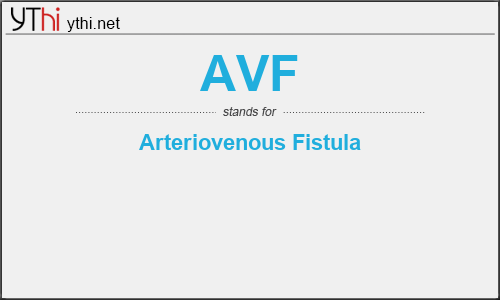What does AVF mean? What is the full form of AVF?
The Full Form of AVF is Arteriovenous Fistula.
An arteriovenous (AV) fistula is an abnormal connection between an artery and a vein. Normally, blood flows from your arteries to your capillaries, and then on to your veins. Nutrients and oxygen in your blood travel from your capillaries to tissues in your body.
With an arteriovenous fistula, blood flows directly from an artery into a vein, bypassing some capillaries. When this happens, tissues below the bypassed capillaries receive less blood.
Arteriovenous fistulas usually occur in the legs, but can develop anywhere in the body. Arteriovenous fistulas are often surgically created for use in dialysis in people with severe kidney disease.
A large untreated arteriovenous fistula can lead to serious complications. Your doctor monitors your arteriovenous fistula if you have one for dialysis.
Symptoms
Small arteriovenous fistulas in your legs, arms, lungs, kidneys or brain often won’t have any signs or symptoms and usually don’t need treatment other than monitoring by your doctor. Large arteriovenous fistulas may cause signs and symptoms.
Arteriovenous fistula signs and symptoms may include:
- Purplish, bulging veins that you can see through your skin, similar to varicose veins
- Swelling in the arms or legs
- Decreased blood pressure
- Fatigue
- Heart failure
A significant arteriovenous fistula in your lungs (pulmonary arteriovenous fistula) is a serious condition and can cause:
- A bluish tinge to the skin
- Clubbing of fingers (the fingertips spread out and become rounder than normal)
- Coughing up blood
An arteriovenous fistula in your gastrointestinal tract can cause bleeding in your digestive tract.
AVF
means
Arteriovenous Fistula![]()
Translate Arteriovenous Fistula to other language.


Leave a Reply
You must be logged in to post a comment.